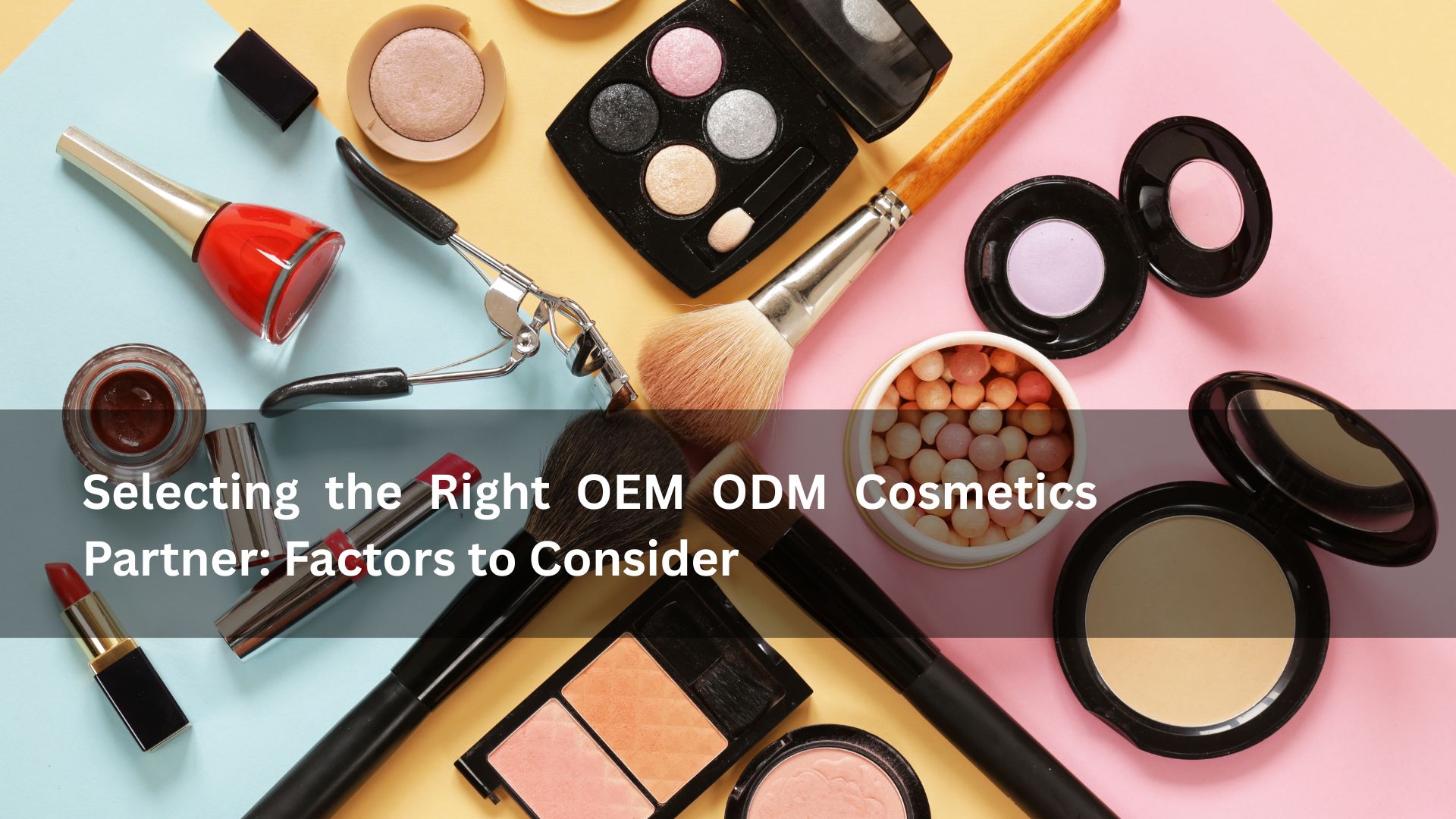In today’s highly competitive and ever-evolving beauty industry, launching a successful cosmetics brand requires more than just a great product idea. The backbone of any flourishing beauty brand lies in the manufacturing process, where quality, innovation, and compliance meet. This is where selecting the right OEM ODM Cosmetics partner becomes critically important. The manufacturer you choose will not only shape the physical product but also influence your brand’s reputation, ability to scale, and market responsiveness. Whether you are an emerging entrepreneur, an influencer launching a new line, or a well-established brand looking to expand, understanding the key factors in selecting the right OEM ODM Cosmetics manufacturer will save you time, money, and potential headaches down the road.
Choosing the wrong partner can lead to inconsistent product quality, delays, regulatory issues, or even intellectual property theft. Conversely, the right OEM ODM Cosmetics manufacturer will act as an extension of your brand, providing expert guidance, maintaining rigorous quality standards, and enabling you to bring innovative and safe products to market swiftly and efficiently. This article will provide a comprehensive guide to help you identify and evaluate prospective OEM ODM Cosmetics partners by outlining critical criteria you must consider before committing to a long-term collaboration.
Understanding the Importance of Choosing the Right OEM ODM Cosmetics Partner
At its core, the relationship between a beauty brand and its OEM ODM Cosmetics partner is a strategic alliance. The right partner can elevate your product from a mere concept to a market leader, while the wrong choice could jeopardize your entire brand. This partnership determines everything from product safety and compliance with international regulations to packaging quality and supply chain efficiency. Moreover, the cosmetic manufacturing landscape includes a broad spectrum of players—from large multinational manufacturers to smaller niche experts—each with different capabilities, certifications, and technological sophistication.
A trustworthy OEM ODM Cosmetics partner understands your unique brand story, target audience, and market positioning. They will collaborate closely with your team to customize formulations, innovate packaging, and support compliance across different regions. They also bring industry insights, helping you anticipate trends and stay ahead of competitors. Hence, investing significant effort in selecting the right partner ensures your cosmetics are not only beautiful but also safe, effective, and scalable for growth.
Evaluating Experience in the OEM ODM Cosmetics Industry
Experience is a vital criterion when vetting potential OEM ODM Cosmetics manufacturers. Cosmetics manufacturing involves stringent technical processes, quality assurance, and adherence to complex regulations, all of which require seasoned expertise. Manufacturers with a proven track record typically have streamlined production workflows, robust quality control measures, and a history of successful product launches across different categories like skincare, makeup, haircare, or personal care.
When evaluating experience, examine how long the manufacturer has been in business and their client portfolio. Do they specialize in your product type or market niche? Have they worked with brands of similar size and growth trajectory? Experienced OEM ODM Cosmetics partners can anticipate common pitfalls, optimize formulation efficacy, and navigate regulatory challenges effectively. Additionally, they often invest in advanced R&D capabilities to innovate products, which is crucial for maintaining competitiveness in the beauty industry.
Assessing Product Quality in OEM ODM Cosmetics Partnerships
Product quality is non-negotiable in the cosmetics industry. Your brand’s reputation hinges on consistently delivering safe, effective, and appealing products to consumers. When choosing an OEM ODM Cosmetics partner, scrutinize their quality assurance processes from raw material sourcing through final packaging. A reputable manufacturer will source high-grade, often traceable, ingredients and maintain rigorous standards in formulation, mixing, and filling.
Request samples early in the selection process and test them thoroughly for texture, fragrance, efficacy, and safety. Quality in OEM ODM Cosmetics extends beyond the formula—packaging durability, visual appeal, and ease of use are equally important as these factors influence consumer satisfaction and brand loyalty. Insist on transparency regarding batch testing results, shelf-life studies, and stability tests. Partners who demonstrate a commitment to quality control reduce the risk of product recalls or negative reviews, safeguarding your brand’s long-term success.
Checking Certifications and Compliance for OEM ODM Cosmetics Manufacturers
Regulatory compliance and certifications play a crucial role when partnering with OEM ODM Cosmetics manufacturers. The cosmetics industry is tightly regulated worldwide, with specific rules around ingredients, labeling, product claims, and manufacturing practices. For example, markets like the European Union, United States, and Japan require strict adherence to GMP (Good Manufacturing Practice), product safety testing, and ingredient restrictions.
When selecting a partner, verify that they hold internationally recognized certifications such as ISO 22716 for GMP, ISO 9001 for quality management, and cruelty-free or organic certifications if relevant. A certified OEM ODM Cosmetics manufacturer will also maintain documentation like MSDS (Material Safety Data Sheets) and COA (Certificate of Analysis) for every batch produced, essential for compliance audits and consumer trust. Partners offering assistance with product registration and regulatory submissions demonstrate a higher level of professionalism and support, crucial for launching in global markets.
Customization Capabilities of OEM ODM Cosmetics Partners
Customization lies at the heart of the appeal of OEM ODM Cosmetics manufacturing for beauty brands. While ODM models provide faster entry with ready-made products, many brands aspire to differentiate themselves through unique formulations, ingredient profiles, or packaging aesthetics. OEM partners allow brands to develop bespoke products tailored precisely to their vision and target audience.
Evaluate how much flexibility your prospective OEM ODM Cosmetics manufacturer offers. Can they formulate products aligned with clean beauty, vegan, cruelty-free, or organic standards? Are they capable of modifying textures, colors, or scents to match your brand identity? Packaging customization is equally important—look for partners who can deliver innovative, sustainable, and visually appealing solutions that help your products stand out on shelves and online. The right partner should work as a co-creator, blending technical expertise with creative freedom.
Understanding Minimum Order Quantities (MOQs) in OEM ODM Cosmetics
Minimum Order Quantities (MOQs) can be a major consideration, especially for startups and smaller brands. Many OEM ODM Cosmetics manufacturers require MOQs to cover their operational costs and raw material purchases, but these can vary dramatically—from a few hundred units to tens of thousands. Excessively high MOQs can tie up capital, increase inventory risk, and restrict your ability to test new products.
When evaluating OEM ODM Cosmetics partners, clearly understand their MOQ policies and whether they offer flexible arrangements for smaller runs or pilot batches. Some manufacturers specialize in startup-friendly orders or provide graduated MOQs that scale with your brand. Understanding MOQs upfront helps you plan your budget, avoid overstock, and test market demand before committing to larger production runs.
Lead Times and Production Schedules in OEM ODM Cosmetics Manufacturing
Time-to-market is critical in the dynamic beauty industry, where trends emerge and fade rapidly. A dependable OEM ODM Cosmetics partner should offer transparent lead times and be able to accommodate your launch schedule. Delays in production can result in missed sales opportunities, excess marketing spend, and customer dissatisfaction.
Inquire about typical turnaround times for sample production, initial runs, and reorder cycles. Assess their ability to handle rush orders or seasonal spikes. Manufacturers with automated production lines, reliable suppliers, and streamlined quality control can significantly reduce lead times without compromising product quality. Clear communication and realistic scheduling will ensure you meet your product launch deadlines and can respond quickly to market changes.
Evaluating Pricing Structures of OEM ODM Cosmetics Partners
Pricing is often a deciding factor but should be weighed alongside quality and service. When reviewing pricing proposals from OEM ODM Cosmetics manufacturers, request detailed breakdowns that include unit costs, setup fees, packaging expenses, customization charges, and any additional services such as regulatory support or expedited shipping.
Beware of hidden fees or pricing models that seem too good to be true, as they may reflect compromises in quality or service. Consider the total cost of ownership, including potential costs related to delays, product recalls, or rework. The ideal partner will offer competitive pricing aligned with transparent, fair terms, and be open to negotiating volumes or long-term contracts that benefit both parties.
Innovation and R&D Support in OEM ODM Cosmetics Partnerships
Innovation drives growth in the cosmetics industry, and your OEM ODM Cosmetics partner should be an innovation ally. Manufacturers investing in R&D can help your brand stay ahead by introducing novel ingredients, enhancing product textures, or developing eco-friendly packaging.
During your selection process, explore the manufacturer’s R&D capabilities and willingness to collaborate on product development. Do they have dedicated labs and expert formulators? Are they proactive in suggesting improvements or responding to emerging consumer preferences? Strong R&D support allows you to adapt quickly, differentiate your brand, and maintain consumer interest in a saturated market.
Quality Control and Testing Procedures in OEM ODM Cosmetics
Effective quality control is paramount in ensuring your products meet safety and efficacy standards consistently. The best OEM ODM Cosmetics manufacturers employ multi-tiered quality control processes, including raw material inspection, in-process monitoring, and final product testing.
Request details on their testing protocols—do they conduct microbiological tests, stability studies, heavy metal analysis, and allergen screenings? How often are quality audits performed? A partner who embraces rigorous quality control reduces risk and protects your customers, enhancing brand trust and loyalty.
Packaging Solutions Offered by OEM ODM Cosmetics Manufacturers
Packaging is not just functional; it’s a powerful branding tool. An experienced OEM ODM Cosmetics partner offers a wide range of packaging options that cater to aesthetics, sustainability, and regulatory compliance. They should be able to support custom designs, eco-friendly materials, tamper-evident features, and clear labeling.
Discuss your packaging vision with prospective manufacturers. Can they produce glass, plastic, or biodegradable containers? Do they support unique dispensing mechanisms or embossing? Strong packaging solutions ensure your product stands out visually and meets consumer demands for sustainability and safety.
Supply Chain and Logistics Management in OEM ODM Cosmetics
Behind every successful product is an efficient supply chain. A reliable OEM ODM Cosmetics partner must manage raw material procurement, inventory, production scheduling, and distribution logistics seamlessly. Delays or shortages in any link can disrupt your entire sales cycle.
Evaluate the manufacturer’s supply chain robustness. Do they have multiple raw material suppliers to mitigate risk? What is their approach to inventory management and order fulfillment? Transparent logistics and contingency planning are critical to ensuring timely delivery and consistent availability of your cosmetics products.
Communication and Customer Service in OEM ODM Cosmetics Partnerships
Strong communication forms the foundation of a successful partnership. Your OEM ODM Cosmetics manufacturer should be responsive, proactive, and transparent. They should provide regular updates on production status, potential issues, and regulatory changes.







